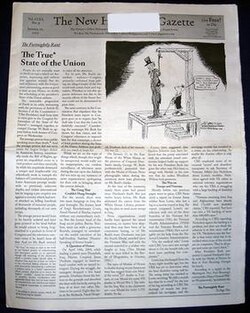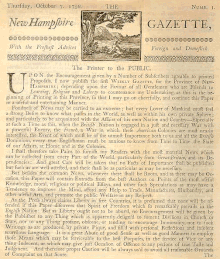The New Hampshire Gazette: Difference between revisions
m →Content |
→Content: corrected typo |
||
| Line 40: | Line 40: | ||
=== Content === |
=== Content === |
||
Published every two weeks as a smaller format [[broadsheet]], usually of 14-20 pages, the ''Gazette's'' front page is usually an editorial called the "The Fortnightly rant" covering a few subjects of national or regional |
Published every two weeks as a smaller format [[broadsheet]], usually of 14-20 pages, the ''Gazette's'' front page is usually an editorial called the "The Fortnightly rant" covering a few subjects of national or regional importance, accompanied by a [[political cartoon]] by Mike Dater reflecting the editorial. The motto of the newspaper is the motto of the state of [[New Hampshire]], ''[[Live free or die]]''. |
||
Among articles of varying size and content are regular columns such as "Moving Pictures" (film commentary) by Rodman Philbrick and most notedly a regular essay, "History Matters," covering two pages or more by Portsmouth [[historian]] [[J. Dennis Robinson]]. Other regular features include "Hate Mail, Mash Notes, & Other Correspondence" (the letters page), the "Northcountry chronicle", an editorial by [[William Marvel]], "Free The Media Press" (stories culled from the New Hampshire [[Indymedia]] Collective), and a reprinting of "Vintage News" from past issues of the ''Gazette'' usually dating to the mid-1800s, ("Better old news, than new lies."). The most popular section of the newspaper is "Admiral Fowle's [[Piscataqua River]] [[Tides|Tidal]] Guide" on the last page which, in addition to a chronology of the tides to take place over each day of the upcoming two weeks, contains an idiosyncratic, and often hilarious listing of significant events from that day in history. |
Among articles of varying size and content are regular columns such as "Moving Pictures" (film commentary) by Rodman Philbrick and most notedly a regular essay, "History Matters," covering two pages or more by Portsmouth [[historian]] [[J. Dennis Robinson]]. Other regular features include "Hate Mail, Mash Notes, & Other Correspondence" (the letters page), the "Northcountry chronicle", an editorial by [[William Marvel]], "Free The Media Press" (stories culled from the New Hampshire [[Indymedia]] Collective), and a reprinting of "Vintage News" from past issues of the ''Gazette'' usually dating to the mid-1800s, ("Better old news, than new lies."). The most popular section of the newspaper is "Admiral Fowle's [[Piscataqua River]] [[Tides|Tidal]] Guide" on the last page which, in addition to a chronology of the tides to take place over each day of the upcoming two weeks, contains an idiosyncratic, and often hilarious listing of significant events from that day in history. |
||
Revision as of 23:14, 25 October 2008
 January 26, 2007 (subscription edition) of The New Hampshire Gazette | |
| Type | Bi-Weekly newspaper |
|---|---|
| Format | Small format broadsheet |
| Owner(s) | Independent |
| Publisher | Steven Fowle, Editor in Chief |
| Founded | 1756 / 1989 |
| Political alignment | Progressive |
| Headquarters | Portsmouth, New Hampshire |
| Website | nhgazette.com |
The New Hampshire Gazette is a non-profit, alternative, bi-weekly newspaper published in Portsmouth, New Hampshire. Its editors claim that the paper, published on-and-off in one form or another since 1756, is America's oldest newspaper and has trademarked the phrase "The Nation's Oldest Newspaper."
History
The New Hampshire Gazette was founded in Portsmouth on October 7, 1756, by printer Daniel Fowle. It was the first newspaper of any type in the Province of New Hampshire. In his years in Boston before founding the Gazette, Fowle, a slave-holder, was the first to print the words of Samuel Adams, and had spent time in prison for printing anti-British pamphlets "The Monster of Monsters" and "A Total Eclipse of Liberty."
The Gazette continued to be published through Fowle's death in 1787, and in 1839, it was recognized as the oldest newspaper in America after the Maryland Gazette ceased publication. Starting in the 1890s, the Gazette was published by The Portsmouth Herald on weekends as a supplement to the Herald. In 1960, the Gazette was renamed the Herald Weekend Edition, although the masthead indicated that the paper was "Continuing the New Hampshire Gazette."
In 1989, it was discovered by a descendant of Daniel Fowle's, Steven Fowle, that the Herald let go of the trade name for the Gazette. Fowle registered the rights to the name and that spring began publishing the Gazette as an independent entity "episodically, in a very small format" until May 1, 1999, when it began to be published in its current format and schedule.
Claims of seniority

The Gazette is not the only paper to claim primacy in seniority. The Hartford Courant, founded in 1765, claims to be the nation's oldest newspaper, as well. Interestingly, the Courant says on its website, "with all such historical questions, the answer depends largely upon who's doing the asking, who's answering, and what, exactly, the question is."
The argument from the Courant, which started publication eight years after the Gazette, is that it has been "continuously" published, while the Gazette was indeed subsumed into the weekend Herald. First, such co-publication is not entirely uncommon, as one local New Hampshire example attests: the Concord Monitor, in the copyright on its website says "(c)1997-2007 Concord Monitor and New Hampshire Patriot," the Patriot being a paper it absorbed years ago, even though nowhere in the paper's title does it mention the Patriot. This can be looked at much in the same way as a corporate merger, except with the case of the Gazette, one portion independently spun back out on its own. Second, most newspapers have had periods when they went through lean periods with irregular publishing and this criticism is easily repelled. Though its trajectory throughout its publishing history is best described as unusual, the Gazette has been published non-stop in one form or another since its inception, and indeed may have a legitimate claim to being the "nation's oldest paper."
Content and format
The Gazette, as an alternative paper, is more focused on commentary than the reporting of day to day, or week to week events. It's editorial content can easily be described as "liberal." In recent years the paper has cemented its self-imposed mission as an independent voice railing against corporate media and conservative political control.
Content
Published every two weeks as a smaller format broadsheet, usually of 14-20 pages, the Gazette's front page is usually an editorial called the "The Fortnightly rant" covering a few subjects of national or regional importance, accompanied by a political cartoon by Mike Dater reflecting the editorial. The motto of the newspaper is the motto of the state of New Hampshire, Live free or die.
Among articles of varying size and content are regular columns such as "Moving Pictures" (film commentary) by Rodman Philbrick and most notedly a regular essay, "History Matters," covering two pages or more by Portsmouth historian J. Dennis Robinson. Other regular features include "Hate Mail, Mash Notes, & Other Correspondence" (the letters page), the "Northcountry chronicle", an editorial by William Marvel, "Free The Media Press" (stories culled from the New Hampshire Indymedia Collective), and a reprinting of "Vintage News" from past issues of the Gazette usually dating to the mid-1800s, ("Better old news, than new lies."). The most popular section of the newspaper is "Admiral Fowle's Piscataqua River Tidal Guide" on the last page which, in addition to a chronology of the tides to take place over each day of the upcoming two weeks, contains an idiosyncratic, and often hilarious listing of significant events from that day in history.
Circulation
The paper's circulation, at over 5,500 readers, is relatively small, but considering that it is a non-profit independent paper that has no marketing, it can be considered a significant number. Its readership is also very loyal, with nearly 1,000 mail subscribers spread out throughout the country.[1]
Website
For many years, the website for the Gazette had many resources in relation to its history, including a 19th century reproduction of its very first issue, a timeline and explanation of its position as oldest newspaper, and much more. Beginning the summer of 2007, the website changed focus and format to that of blog-type website. Content from each issue of the paper is minimal in comparison with how most newspapers publish articles online as well as in print, though the Gazette occasionally does offer a .pdf of an issue, usually a couple of weeks after its publication.
